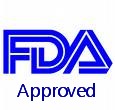Home HIV tests are convenient, private and confidential, but are they accurate?
The U.S. Food and Drug Administration (FDA)-approved HIV home tests are as accurate as the

antibody tests done in doctors offices and health departments. The FDA has tested the blood sample collection process and the laboratory interpreting the results and issued this statement about the FDA approved HIV test:
The accuracy of the Home Access HIV-I Test System is therefore estimated to be 100% (95% confidence interval 99.7-100%) based on correct identification of 1 147/l 147 clinical trial specimens. (FDA Summary of Safety and Effectiveness)
The home collected blood samples are shipped to a laboratory meeting CLIA requirements and complying to the FDA’s Good Manufacturing Practices (GMP). The testing of specimens occurs in a dedicated laboratory where all testing processes and procedures are performed in accordance with written standard operating procedures. As per the GMPs, laboratory equipment and the Information Systems system have been formally validated. All laboratory employees are required to undergo GMP training and proficiency
generic viagra training.
Only one HIV home collection test system is approved by FDA and legally sold in the United States. This test, sold as either "
The Home Access HIV-1 Test System" or "
The Home Access Express HIV-1 Test System" is manufactured by Home Access Health Corporation and allows blood samples to be taken at home, which people then send to a laboratory for testing.
The FDA has not approved any home HIV test kit that allows consumers to interpret their own results at home or "instant" kits. The FDA has a
consumer awareness program to warn about some false claims of home HIV test kits with instant at home results.
The Home Access HIV-1 Test Systems were approved by the FDA under PMA guidance, the strictest level of approval from the FDA, in 1996. While the FDA statement of accuracy cited above can be confusing, Home Access Health Corporation boils it down to this, "
Clinically proven to be more than 99.9% accurate".